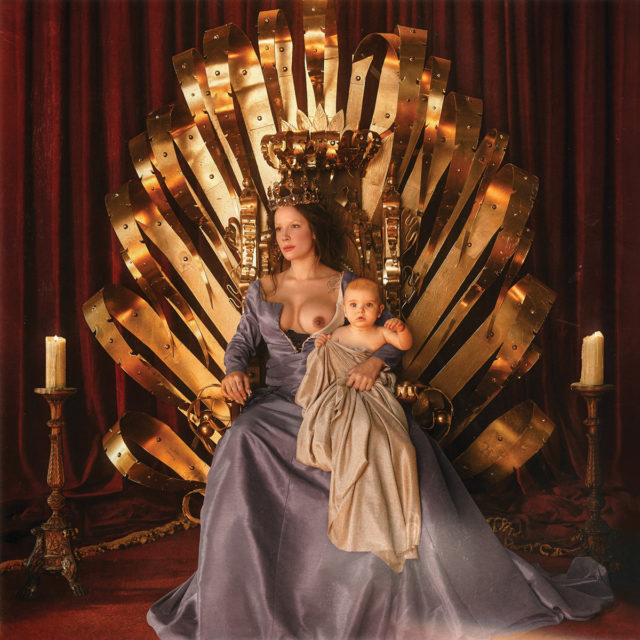It’s Halsey’s world and everyone else is just living in it.
In their fourth album, “If I Can’t Have Love, I Want Power,” Halsey navigates the journey of childbirth in a world of royalty, tragedy and witchcraft. The outspoken artist is no stranger to concept albums – their debut “Badlands” explored a dystopian wasteland while “Hopeless Fountain Kingdom” retold the story of Romeo and Juliet. However, on this latest album, Halsey perfects their art with an accompanying film that masterfully encapsulates their expressive songwriting amid a new, darker sound crafted by producers Trent Reznor and Atticus Ross of Nine Inch Nails.
The visual album accompanying “If I Can’t Have Love, I Want Power,” is an indulgent and unapologetic story of motherhood. In the film, Halsey dually presents themself as a widowed queen pregnant with the son of their royal abuser and a powerful being with paranormal capabilities. With gaudy ballgowns and flashy makeup, the film is as camp as the album that accompanies it.
The first song in the film “Bells in Santa Fe” is appropriately cinematic. Halsey’s vocals are echoic – the song’s production is relatively restrained compared to the typical musings of Nine Inch Nails, but the layered vocals emphasize the forlorn lyrics. Featuring perpetually plucking instrumentals and humming bass line that suddenly drop off into the next song, the track keeps the listener entranced by Halsey’s narrative.
[Related: Album review: Halsey takes listeners on her emotional, self-reflective journey in ‘Manic’]
The influence of Reznor and Ross is heard more clearly on “Easier than Lying.” Reminiscent of Evanescence, Halsey nearly shouts, “One eye open and one eye closed / ‘Cause I’ll hang myself if you give me rope” atop a quick-paced drum beat and fiery guitar strums. But the song is far from monotonous clamor as Halsey transitions into a lighter voice that resonates above the aggressive production.
Meanwhile on “Lilith,” Halsey exchanges grunge rock instrumentation for a ’90s hip-hop beat. Vocal distortions heard throughout the song give Halsey’s rhythmic recitation unexpected but welcome variations as they repeat lyrics. They carry this ’90s influence with twinkling instrumentation in “Girl is a Gun,” featured in the film as background to a drunkenly running Halsey. Together, both songs offer diversity among the guitar-laden production of prior songs without straying too far from the sonic cohesiveness of the album altogether.
Contrarily, soft with only pianos and acoustic guitars, “Darling” marks a stark departure from the tense production of the rest of the album. Whereas prior songs explored Halsey’s frustrations with their body as a vessel for their child, Halsey’s true joy for motherhood effortlessly shines through in this track. As if speaking to their future child, Halsey sings, “Until it’s time to see the light / I’ll make my own with you each night.”
Moving away from their desire for motherhood, “Whispers” explores the Madonna-whore complex Halsey cites as inspiration for the album. Beginning with slow piano chords, Halsey switches between their chest voice and the whispered secrets as they question, “This is that space in your bed that says, ‘Bet I could fuck him’ / Isn’t it lonely?” Complementary vocals provide further confirmation of Halsey’s ability to construct a covertly analytic song within the confines of their world building.
[Related: Album review: ‘Solar Power’ delivers powerful statements, ultimately falls short of expectations]
The antepenultimate song on the album “I am not a woman, I’m a god,” heard toward the end of the accompanying film, is a revitalizing admonition of Halsey’s desire for power. While the song features a forceful bass line that propels it forward, the integrated staccato scales distract from Halsey’s lyricism. However, their proclamations, “I am not a woman, I’m a god / I am not a martyr, I’m a problem,” are specifically layered to highlight the conflicting narratives of a woman’s existence and provide a refreshing burst of energy nearing the album’s close.
Connecting back to the laid-back instrumentation of “Darling,” final track “Ya’aburnee” reads like a love letter. The song’s production is laden with a strumming guitar and faint chimes in the background. Over the course of the album, Halsey grapples with the joys and perils of motherhood, femininity and sexuality, but in “Ya’aburnee,” they ultimately find solace and peace in both their child and their lover.
With a sudden sonic shift from their prior albums and a complex conceptual exploration, “If I Can’t Have Love, I Want Power” was a large risk that Halsey gracefully pulled off. While the album and its accompanying film are not entirely succinct in their track lists, they both ingeniously explore the microcosm Halsey conceived.
While Halsey claims, “If I Can’t Have Love, I Want Power,” they sacrifice neither in their unapologetic album.


